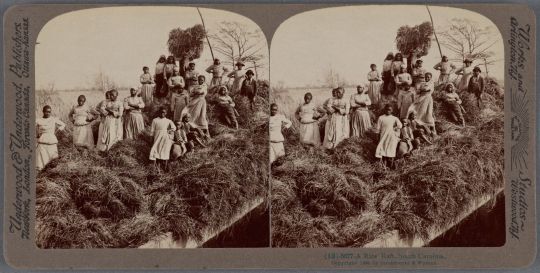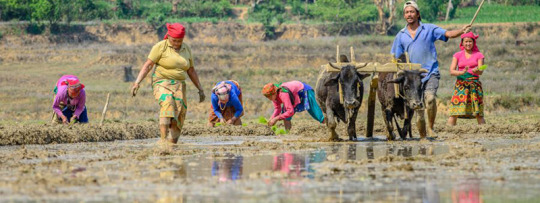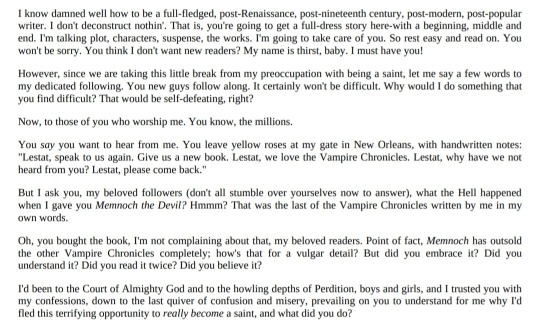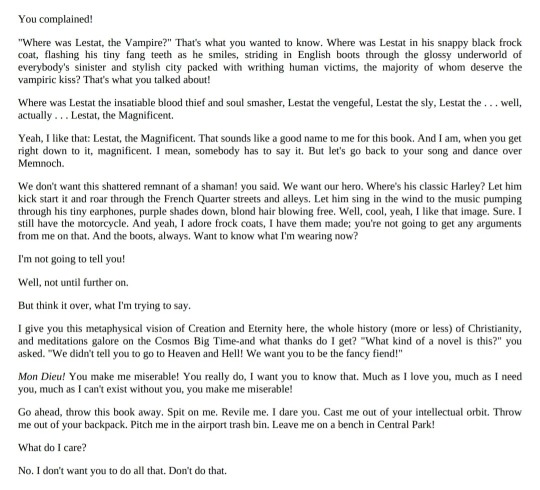#rice plantation
Text
why do white folks think emphasizing with slavers and white supremacists is like some feat of maturity or high literacy or whatever like maybe this is a hot take but I think it's good to hate them. I think that's not only ok I think it's great and we need more of it in the world
#drama txt#This is rhetorical btw I know why#Also to claim Anne rice wanted the audience to struggle with white Lewis and being a slave owner is laughable.#ol girl LOVED that plantation aesthetic#and if she did want to actually challenge it she failed miserably. Like on a base writing level
18 notes
·
View notes
Text

A stereoscope of plantation workers -- seemingly women and children -- riding on a rice raft in South Carolina, 1895. These workers would have been bringing straw from the rice plants to feed livestock after harvesting the more valuable rice grains.
{WHF} {Ko-Fi} {Medium}
89 notes
·
View notes
Text
in my rediscovery of the interview with a vampire series that's about to start airing, it's been hilarious watching people actually get red-faced, hand-wringing angry in online spaces about 'yet another remake that no one asked for' when in fact the 1994 movie theyre all claiming to be a 'perfect adaptation' was notoriously disliked by the author (tom cruise as lestat specifically jhkjdhsfjkg) and heavily criticized for removing the gay subtext TEXT laden throughout the original story. people angry about the change in the time period as well arent really understanding how poorly a sympathetic plantation owner living in 18th century louisiana would age nowadays (and how poorly they age period)... this is why i wish more people understood what kind of skill adapting something from page to screen is, that it's difficult and an art in its own right, when done well. think about jojo rabbit, a film adapted from a novel that's got a completely different tone compared to its source material, but still poignant and manages to deliver an enrapturing, endearing story dealing with extremely dark and sobering themes. sometimes it's literally not possible to adapt something word for word, and i think fans of the books should count themselves lucky that anne rice was involved in production until she passed. the thing with interview with a vampire however, aside from appropriately casting way more black actors in a setting that, let's be quite clear, was completely whitewashed in the film, is that it's telling a queer dramatic story. it's doing what the film was too scared to do, which is be SUPER GAY and the 1994 film was only 'great' or 'perfect' for all those people who thought they may have stood a chance with brad or tom (who in my opinion werent even well-cast!) 🤷🏻♀️
#i get a little mean at the end of this post but like sorry it's too easy#anyway!#yes i read the novel i know how more time passed indicates a vampire's power#but like honestly that detail is NOT important enough to repeat what the film did when it would only make the protag both#unsympathetic and just not the kind of guy people should root for!#sometimes details in novels age poorly and honestly plantation owner louis sure did! esp bc it rly doesnt add much to the overarching theme#interview with a vampire#interview with a vampire 2022#anne rice#sammy.txt
70 notes
·
View notes
Note
I hope they removed the plantation part of Louis' back story, I looked up the actor and he's afro-carribean
Oh yes! According to the trailer, they’ve pushed the timeline for Louis’s first encounters with Lestat forward to 1910. It looks like this Louis might operate a set of brothels…still not great, but at least the show appears to have excised one of the most noxious aspects of his original backstory from the novels.
#tw slavery#i love these vampires but anne rice included some dodgy shit in the books that frankly did not need to be there#ma’am you could have just made louis Some Dude rather than the owner of a whole plantation 😭#so i’m relieved that the show is going in a different direction#hoping they’ll handle the subject matter with respect and sensitivity
9 notes
·
View notes
Text
Kinda wanna watch the new iwtv........
#ome of my qualms is that i assume this version does not have mortal louis as a plantation owner#which is like. it's all a mess bc it's anne rice. but how do they handle it yk?#bc he's played by a black actor?#oh those tags went out of order#anyways. on the other hand. gay vam pire?????? i may be stupid#txt
2 notes
·
View notes
Text
タウエ

田植えは、水田などで水を張った土地に稲の苗を植え付ける作業のことです。主に米作りにおいて行われる重要な作業であり、以下の手順で行われます。
準備: まず、田んぼに水を張ります。これは稲が植え付けられる前に土壌を軟らかくするために行われます。また、水は稲の成長を促進し、雑草の生育を抑制する役割も果たします。
苗の準備: 田植えのためには、苗を用意する必要があります。通常、苗は種籾(たねもみ)から育てられます。育苗場で苗を育て、田植えの時期になったら準備が整います。
田植え: 準備が整ったら、田んぼに苗を植え付けます。これには、苗を一定の間隔で植える機械を用いる場合もありますが、一部の地域では手作業で行われることもあります。苗を植える際には、一定の深さと間隔を保つことが重要です。
育成: 田植えが完了すると、稲は成長し始めます。この時期には、水位の管理や雑草の除去など、適切な管理が必要です。
収穫: 稲が成熟すると、収穫の時期がやってきます。収穫にはさまざまな方法がありますが、一般的には稲穂を刈り取り、乾燥させてから籾(もみ)を取り出します。
田植えは、農作業の中でも重労働であり、農家にとって大変な作業ですが、豊かな収穫を期待する重要な過程でもあります。
手抜きイラスト集
0 notes
Text

#plant lover#how to plantation#gardening#trending#plant near me#rice#rice vinegar#100 days of productivity
1 note
·
View note
Text
Rice Plantation Day showcases the agricultural heritage and highlights the importance of rice cultivation in Nepal's economy and culture. It symbolizes the beginning of the monsoon season and marks the crucial period for rice cultivation, which sustains the livelihoods of many Nepalese farmers.
#gemsartsjewellery#rice#plantation#harvest#family#célébrations#Peace#Happiness#Love#Lazimpat#kathmandu#kathmanduvalley#nepal#diamonds#gold#silver#gemstones#jewellery#gems
0 notes
Text
Thinking ab POC vampires
#vampire#the american and slavic strains#pale#meant to hide from the sun#dark leathery wings to bled in with the forest at night and withstand take off through heavy branches#african and japanese strains#tanned for withstanding the sun#colourful feathered but still very sharp wings to hide in dry grass and rice field#flying silently#differences between natural vamps and bitten#how comfortable they are in their teeth#the presence of wings#visible veins#the strain on their bodies#stubs and sores on their backs but never dtrong enough to grow wings#using makeup to hide eyebags#huge covens that started in hungaria tripped through spain hunted a bit in africa picked up some friends in japan#then finally stole some guys plantation in the americas#finally settling on cowboy vibes because huge slaughter cattle are the only thing big enough to feed them all#human blood becoming a nice treat when the campers in the nearby woods are just a little too loud#somehow#the original vamp still has his accent#nobody knows how he hasn't disintegrated yet
0 notes
Text
Ashar 15 | Ropain Diwas, The Famous Festival of Nepal
Ashar 15 | Ropain Diwas, The Famous Festival of Nepal
Introduction
In this digital era, the world is moving forward very quickly and growing fast, and people are in a race to go along with the world.
But there are some rituals and cultural festivals like Ashar 15 which take us back to those memories when there were no digital gadgets and no need for digital equipment to enjoy the work and to connect to their soil and roots.
Known by other…

View On WordPress
0 notes
Text
Walking Type Manual Paddy Rice Transplanter Double Rows - Krishitool.in
Book Now: https://www.krishitool.in/product_details/Walking_Type_Manual_Paddy_Rice_Transplanter_Double_Rows

Rice Planter, Manual Rice Planter, manual transplanter, paddy planter,rice planting machine,Rice sowing machine,Rice seedling machine, small rice planting machine,rice crop planting machine,mini rice transplanter,
Rice transplanter online,Rice Sowing machine online, Rice transplanter online, rice transplanter machine,Rice seeding machine,paddy transplanter machine, paddy plantation machine, paddy sowing machine, manual transplanter, small rice planting machine, rice crop planting machine, bicycle rice planter,mini rice transplanter, rice sowing machine, paddy plantation machine,transplanting paddy, rice plantation machine,paddy planting machine,
#rice planter#manual rice planter#manual transplanter#paddy planter#rice planting machine#Rice sowing machine#Rice seedling machine#small rice planting machine#rice crop planting machine#mini rice transplanter#rice transplanter online#rice sowing machine online#rice transplanter machine#rice seeding machine#paddy transplanter machine#paddy plantation machine#paddy sowing machine#bicycle rice planter#transplanting paddy#rice plantation machine#paddy planting machine
0 notes
Text
Windbreaker Official Q&A !
Part1 › Part2
(answer releases are slow, so I’ll post an update probably within a month or so?) -> Q&A hosted here
1. What would you spend 500 yen on?
Sakura: “I’d buy Saboten’s Curry Bread.”
Nirei: “I’d like to buy more notebooks!”
Sugishita: “Dunno.”
Kotoha: “A cup of delicious coffee.”
Suo: “I would donate it of course.”
Hiragi: “I just ran out of stomach medicine.”
2. If you were to travel in Japan, where would you like to go?
Sakura: “Well… a place worth taking a walk.”
Nirei: “We should all go to Okinawa, it looks like fun.”
Sugishita: “Dunno.”
Kotoha: “I want to see the snowy scenery of nature in Hokkaido.”
Suo: “I’d like to go to a tea plantation in Shizuoka and pick tea.”
Hiragi: “I want to try snowboarding, so probably a ski resort.”
3. What is your favorite seasoning?
Sakura: “Ketchup. Omurice with ketchup is the best.”
Nirei: “I like to eat rice cakes with sugary soy sauce!”
Sugishita: “Dunno.”
Kotoha: “Japanese-style soup stock. With that, I can make anything delicious.”
Suo: “I’d say soy sauce. It's sweet, isn't it?”
Hiragi: “It's delicious if you put miso on nigiri rice and bake it.”
4.) What do you think about before going to sleep?
Sakura: “Fighting.”
Nirei: “I think about everyone I was with that day.”
Sugishita: “Dunno.”
Kotoha: “Pothos's sales status.”
Suo: “The dragon sealed in the left eye is about to rampage, so I guess that's it, haha.”
Hiragi: “If I can’t sleep, I try not to think about it.”
5. What would you eat for your last meal?
Sakura: “What… Why is it the last one? I’ve never thought about it.”
Nirei: “High-class meat. I want to eat til I’m full!”
Sugishita: “Dunno.”
Kotoha: “I dont care what I eat, I just want to eat it with everyone at the facility and the teachers.”
Suo: “Hmm, I don’t need to eat anything.”
Hiragi: “If it’s my last meal, then that must mean I’m in a bad situation, right? That means my stomach hurts, and I wonder if I can eat it. If I can eat it, I might say Katsudon.”
6.) What happened recently that made you happy?
Sakura: “At the butcher's... I got a bonus when I bought croquettes…”
Nirei: “I was able to have small talk with Mr. Umemiya.”
Sugishita: “Dunno.”
Kotoha: “Customers really liked the new menu.”
Suo: * “I had two tea pillars stand recently.”
Hiragi: “I got a ticket for my favorite band.” (LETS GO TOGETHER PLEASE!!!)
* When pouring freshly brewed loose-leaf tea, you can sometimes expect to find a tea stem/pillar in your tea. It’s considered good luck if one of those pillars stand vertically.
7.) What would you do if a stranger of the opposite sex asked for your contact information?
Sakura: “What?! What are you going to do when you have it!?”
Nirei: “A-are you sure it’s mine you want!? Not Sakura, or Suo’s?!”
Sugishita: “eh… uh…. um…”
Kotoha: “Sorry~ I have a boyfriend.”
Suo: “I don’t have a phone, sorry.”
Hiragi: “O..Oh… is my number okay?” (YES PLEASE)
#I NEEDED TO RELEASE THIS IMMEDIATELY#IVE BEEN WAITING AND BITING MY FINGERS TO RELEASE THIS FOR SO LONG#BUT I CANT DO IT ANYMORE#so im making it a multiple part so that i can finally rest easy#in case no one can tell Hiragi is my favorite and quickly becoming an obsession#he’s so underrated#wind breaker#windbreaker#wind breaker (satoru nii)#wind breaker x reader#wind breaker manga#wind breaker official Q&A#wind breaker headcanons#technically canons???#wind breaker Hiragi#Hiragi toma#toma hiragi#wind breaker Sakura#Sakura#sakura haruka#haruka sakura#wind breaker nirei#nirei akihiko#wind breaker suo#suo hayato#hayato suo#wind breaker sugishita#kyotaro sugishita#wind breaker kotoha#kotoha tachibana
285 notes
·
View notes
Text
"In an effort to save the story from Interview and to save Claudia," [Anne Rice] said, "I suggested we make Louis a woman [in a proposed film version] It works. It's all the same passivity, the same philosophical ideas, the same inability to fight Lestat's domination. It's fine for Louis to be a woman because he is a woman - he's really me."
With Cher or Meryl Streep in mind, she set about creating a transvestite, trans-gender female [sic], whose husband and daughter had died on the way to Louisiana from the Islands. Since women could not inherit plantations, the character steps on shore in her husband's clothes and challenges anyone to say she's not a man. Everyone knows she's a woman and she gets into brawls. "She was a good swordsman," said Anne, "and a good gunfighter, and she kept her plantation, which everyone wanted, by fighting people off. So it was an interesting story. And there were very famous transvestites in this era. It was a common motif."
Katherine Ramsland, Prism of the Night: A Biography of Anne Rice
227 notes
·
View notes
Text
If Ugandans have a social safety net, it is woven from banana fibers, and if there is a clear path to socialism, it will be lined with banana leaves. The lusuku model, premised on intercropping and smallholder farming, could be the basis for national agrarian reform that improves the lives of Uganda’s agricultural workers without accelerating the destruction of the natural environment. Uganda faces increasing difficulty feeding itself because of climate extremes and land degradation, and this affects farmers more significantly than anyone else. Moreover, since the 1990s, the ruling National Resistance Movement regime sold off and dismantled most of the coffee, tea, and cotton growers cooperatives, leaving smallholder farmers in the hands of the predatory middlemen which cooperatives had been established to protect them against. Unable to collectively bargain and exposed to dramatic fluctuations in the market prices for cash crops, many people left rural areas to search for employment in cities. This has been a driving force behind the massive inequality between rural and urban workers.
Ugandans now produce more food than they consume, even exporting to other countries in the region, yet 41% of people are undernourished, and agricultural production has decreased over the last 20 years. For the most part, the strategy pursued by Uganda’s government has been to encourage the development of ecologically disastrous intensive agriculture for export, privileging foreign investors rather than developing the infrastructure that would benefit peasants. Indeed, while more than 70% of Ugandans are employed in agriculture, the sector only receives around 4% of public investment, and projects aimed at helping smallholder farmers have had very little success, even by their own standards. Many of the government’s investments in agriculture very clearly advantage larger landowners, to the detriment of the poorest farmers. For example, most of the government’s investment in labor-saving technologies has been spent on tractors, which are great for large plots but largely unaffordable or unsuitable for the average farmer, whose plot is usually between 1-3 acres large.
However, a socialist transition premised on agroecological reforms could make use of the existing lusuku model to create the kind of growth that actually improves poor farmers’ lives without destroying their environment. This could begin with reestablishing cooperatives and engineering agricultural prices around social needs and goals, like guaranteeing access to food. Research from around the world has shown that while large, monocrop plantations are good at producing huge volumes of one crop, smallholder farms are more productive when evaluated on a per-unit area and are capable of securing national food sovereignty. Why, for example, should Ugandans buy rice imported from Pakistan or Vietnam when banana intercropping yields more calories per hectare than rice? Lusukus could feed the nation without relying on foreign experts, development aid, or the capital-intensive inputs now being imported to grow for export. Because lusukus are far better for the soil, they also improve the nation’s capacity to resist severe floods and drought, effects of climate change that hit poor farmers hardest. In these ways, the lusuku model could provide a sustainable path to socialist development.
284 notes
·
View notes
Text
One of the biggest tells about how many book readers consider book loumand dynamic vs show dynamic and how much race affects that is people posing the question of how Armand feels about Louis being involved with sexual exploitation as something that is applicable "now" bc he was a pimp in the show. Louis being a part of sexual exploitation is not remotely new. He was a plantation owner. Chattel slavery relied on rape as a core aspect of the industry. It was not just something that happened all the time, it was a literal pillar for its continuation within the Americas. Book Armand would almost certainly know that-- just because Anne Rice didn't acknowledge the depths of the horrors of chattel slavery (bc she liked antebellum South as an aesthetic, bc she had a vested interest in whiteness, and bc she was racist) doesn't mean that's not applicable if you're going to seriously ask these questions.
#rape mention tw /#it's not like the question itself isn't an important one.#but it's not remotely specific to the show lmao.#its just the show actually acknowledges it#meta
180 notes
·
View notes
Note
Is there a specific way to read the vampire chronicles or some books you should skip (I’ve just heard that some aren’t that good but like I’m up for anything)? And what books are focused on Louis and Lestat?
Okay I hope you weren't looking for a short answer to this because there isn't one 😭 Rather than just give my uncontextualized opinion, I'm going to try to explain what makes some (most) of VC so unbelievably terrible in so many people's eyes. There are going to be spoilers for pretty much all the books, but most of it is either incredibly stupid or information that you might want relating to content warnings. I'll list what applies to each book as I go.
I'm assuming you're here from my VC primer post, but if not, I'll link it right here! It gives a bit more detail on my short answer to your main question which is: if you value your sanity, only read the first three. Also a note to read the post I linked at the bottom of it about Anne Rice for context. It will help with understanding the tone this post takes re: the author.
To quickly answer your second question, I am sad to report that Interview with the Vampire is the only book focused on Loustat because after that Anne Rice decided that she hated Louis. Their relationship is on and off in the (very, VERY distant) background until they finally get together permanently towards the end of the series, but it's never the focal point again. She just kept us all on the hook by having one absolutely brain chemistry altering ship moment in a majority of the books (my compilation of those moments here).
Okay, on to specifics:
Interview with the Vampire: a literary classic with incredible character building. I'm assuming we can all agree that IWTV is fantastic and anyone who is reading this because of the show is probably already sold on it. If that's where you're coming from, you might be a bit disappointed by how unsympathetic Lestat can be, but that'll be remedied(ish) later. Lestat is the main character in the series going forward. Enjoy this Louis content because this is pretty much the end of it.
CW: keep in mind that the beginning of the book takes place on a plantation with all that entails; there are some occasional pedophilic and incestuous undertones, but nothing out of place with Gothic horror (it gets so much worse); domestic violence
The Vampire Lestat: this is widely considered to be excellent popular fiction rather than something as elevated as IWTV, but it's a 5-star read according to most fans. Lestat is such a vibrant, exciting character and so much more than the charismatic villain he was in IWTV (the AMC show incorporates a lot of his characterization from this book, as IWTV was originally a stand-alone novel without any real idea of what Lestat would become).
Aside from a (delightful) cameo at the end of the book, Louis is now in Anne Rice Jail and will not be allowed to do anything for the next nine books except be tortured once like a bug for no reason.
CW: a non-consensual turning that is directly analogous to sexual assault; descriptions of child abuse; Lestat, unfortunately, tongue kisses his mom
Queen of the Damned: this is the last book that most fans like. I personally consider it a step down from the first two, but I strongly prefer intimate, character driven stories and QotD is very plotty. It's a fun book, but some cracks start to show in AR's writing that will become a big problem later. Still, it's enjoyable and the ending is very satisfying for the story arc and for the characters. It also contains a fan favorite chapter that follows Daniel, the interviewer, and his insane romance with the vampire Armand.
If you want to be a happy person, turn back now.
CW: non-con blood drinking/vampiric SA; casual racism and pro-imperialism
***CATEGORY 5 EVENT: ANNE RICE FIRES HER EDITOR PERMANENTLY***
The Tale of the Body Thief: this is considered by most fans (obligatory not ALL) to be the worst book in the series simply for how the subject matter is handled. This is the beginning of AR transforming Lestat into something very existentially disturbing without even meaning to. The sympathetic, charming, evil-but-not-really theater kid Lestat is gone without a trace in a way that could be a very insightful look at the aftermath of trauma but is instead deeply insensitive and really upsetting.
Lestat from here on out becomes a hypermasculine caricature that can do no wrong according to the narrative and this has some pretty awful results. There are a few funny moments (like Lestat describing the sensation of peeing for two full pages) and a very cute arc where he adopts a dog, but he also commits two explicit rapes and emotionally abuses/threatens Louis on several occasions with the authorial justification that "men can't help themselves", abuse victims have it coming for setting boundaries, and people who have suffered abuse become abusers. This will be a recurring theme going forward.
Not related to Lestat, but also an Indian man is killed and has his body stolen and inhabited by a white British man in what would be a great metaphor for colonialism if the author thought that was a bad thing.
I am on the last chapter of a 140,000 word fic that I wrote just because I hate TotBT so much and wanted to create a world where it doesn't have to exist. It's one of the most popular VC fics on ao3, and that's not a testament to my writing ability, but rather to how much people hate this book.
CW: graphic SA; domestic violence; insensitivity to the point of racism; the author thinking these things are okay
Memnoch the Devil: not much to say about this. It's AR's ripoff of Dante's Inferno. Lestat meets the devil, goes to hell, drinks the blood of Jesus Christ, loses an eye, vacuum sucks period blood out of a woman's uterus and pad, and then falls into a five year semi-coma on a church floor. Somehow it's still boring. Best I can say is that the Lestat characterization is a bit less heinous than it is in the previous book.
CW: not much here unless you have an issue with period blood guzzling
The Vampire Armand: truly a notorious book in the series, beloved by some, hated by many. There's some good backstory for the character Armand (he first appears in IWTV, likely in season two of the show) and some fun historical fiction, however. Armand begins his story as a twelve year old human child who is rescued from sex slavery by an ancient vampire, Marius (he was namedropped in AMC ep 2).
Over the course of the book, he's physically, mentally, sexually abused by Marius, his teacher and father figure who is, like David, presented as a wise and moral authorit figure. In addition, Armand carries on a sexual relationship with an adult man as a minor. The sex is graphic (it's erotica) and it's really the peak of the pedophilia in VC. Keep in mind that this is coming from an author who publicly defended a child predator and thought that 14 year old kids could consent and should be allowed to have sex with adults.
Of all the later books, this one is the most widely enjoyed because Marius/Armand is a fairly popular ship.
CW: CSA/grooming; statutory rape; explicit adult/minor content; child abuse; cult abuse
Merrick: evil, evil book. AR's giant fuck you to Louis and anyone who likes his character. Lestat is in his devil coma for most of this book, so it's narrated by his newest fledgling and rape victim, David (who I and most others despise. This is the white guy who has an Indian body now). By this point, AR had openly admitted that she didn't like Louis, and she kind of spends this book tormenting and mocking him for no reason.
The titular Merrick (a mixed-race witch drowned in awful racial connotations) mind controls Louis with magic, then forces him to turn her (again, AR has confirmed that this is vampire rape) and be in a relationship. After this, she conjures a "ghost" that may or may not be Louis and Lestat’s dead daughter who tells Louis she always hated him and blamed him for her death. Completely overcome by grief, without Lestat (coma), and having been raped, Louis attempts suicide.
This event and all his mental health issues up to this point are framed by David as being stupid and weak, the sign of a lesser person who should just go and die because they deserve it. It is worth mentioning yet again that David is framed as being in the right and AR had expressed these opinions herself in the past (ie that mental illness is just weakness and you should be able to get over it).
Another fun thing is that Merrick was groomed by David as a child and he spends most of the book wanting her back and also admitting to other acts of pedophilia. So that's fun and great for a character who's supposed to be a voice of reason and moral center.
0/10, despise this book.
CW: sexual assault; grooming; attempted suicide
Blood & Gold: this is Marius' backstory. It is a completely pointless book because we've already heard it twice by this point in the series (and if you read the companion book Pandora, you'll hear it again). The whole thing reads like a Wikipedia page about ancient Rome. Read it if you want I guess.
CW: Marius
Blackwood Farm: this book had...potential? None of that was ever achieved, but I'll at least say that the concept could be worse. Lestat acquires his FIFTH brunette sadboi love interest of the series in this book, so that's kind of funny. Overall though, any positive qualities are overshadowed by weird prose, a really transphobic caricature, and the fact that the main character has shower sex with the ghost of his dead twin brother
CW: transphobia; sibling incest
Blood Canticle: Miss Rice decided to. Get creative with this book. It is a fandom joke. It is the worst prose in existence. It is a literary manic episode. It is truly indescribable. I'm just going to leave this excerpt from ch 1 here and let you imagine an entire book of this


Yes, chapter one is Anne Rice using Lestat as a proxy to berate her readers for not liking Memnoch the Devil. It's also important to me that you know Lestat calls himself "omnisensual" in this book, tries to become a saint, and tells a woman to put some clothes on because men can't control themselves. The word "chuckle" is also written out in the prose in italics like this is ff.net in 2010. The best thing that came of this book is the famous AR Amazon reviews rant (now a beloved VC fandom copypasta). Please read it. It's transcendent.
CW: psychologically devastating prose
Prince Lestat: this is AR's comeback book, published 12 years after Blood Canticle. It's an improvement, but it's still terrible and very, VERY dumb. Lestat has completed his transformation into a macho man male power fantasy for AR and we end with the establishment of a vampire monarchy with Lestat in charge because he slurped and then puked up the brains of the vampire who had the Special Vampire Essence.
Mostly this was an excuse for AR to kill off a bunch of her weird NPCs that she didn't know what to do with. The good news is we get a very cute, official Loustat love confession and for the first time since the first book in the entire series, we get a chapter that's Louis' POV!! It's like 7 pages long but it's the best we're ever going to get.
Other fun thing that happens: Lestat is hooked up to a hormone IV that allows him to fuck (book vampires can't) and the resident scientist vampire steals his cum and creates a petri dish clone of Lestat that is raised in secret for 18 years before being given to Lestat as his son. No, I'm not joking.
CW: uh, brain eating? Insanely unethical human experimentation?
Prince Lestat and the Realms of Atlantis: batshit crazy book. Truly bonkers. There are aliens, Atlantis is real, Lestat has a sentient brain parasite that controls all vampires and talks to him in his mind like the PS5, vampire brain surgery occurs, a choir of child vampires is there, an alien named Derek breastfeeds a disembodied hand until it grows into his clone named Derek Two, and so much more.
The one positive is that after decades of harassment, AR finally lets Louis be a main character again. By this point he has been completely stripped of his personality (I call it the Louis Lobotomy) and exists solely as Lestat's sexy lamp, but whatever. He's there and they're cute together. How they managed to become a healthy, functional couple overnight after two hundred years of drama is never explained.
Lestat makes out with his rapist and talks about how he was asking for it in a particularly nauseating scene, but otherwise it's pretty tame trigger-wise
CW: rape apologia/victim blaming
Blood Communion: we are finally being put out of our misery. The end of the series. This is such a boring book and Lestat’s characterization is completely nonsensical by now. Several main characters are presumed dead for a while and by this point you don't even care. Not even the other characters in the book seem to care. Its only use is to get that sweet sweet Loustat happy ending.
CW: temporary character death
-
Alright, that was a lot of shit-talking a book series I literally run a fandom blog and write hundreds of thousands of words of fic for, but the truth is, fans are here for the characters as they were originally created. The first three books are wonderful, the first two completely masterful and case studies in how character building should be done. There's a reason they've been read and analyzed and fawned over for forty years. What happened to the series is heartbreaking, but it doesn't negate the impact of how it started.
AR may have started spelling her own characters' names wrong and writing a baffling combination of disgusting hot takes and total absurdity, but she created something special in the beginning and I'll always love it and be grateful for what it once was.
I hope that was helpful!
#i'm sorry i didn't proofread this it's 4am#answered#vc#the vampire chronicles#iwtv#loustat#louis de pointe du lac#lestat de lioncourt#interview with the vampire
1K notes
·
View notes